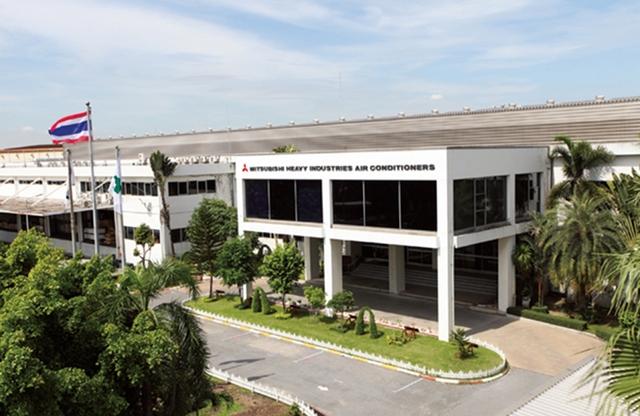SUPPORTING SCHOOLS IN THAILAND
Striving to Be a "Good Corporate Citizen." Supporting Schools to Co-exist with the People of Thailand
Mitsubishi Heavy Industries manufactures and sells a variety of products, from power stations to residential air-conditioners. The company not only manufactures environmentally friendly products, but also engages in people-friendly activities in Thailand where there is a factory. This is an introduction to this initiative.
- This is content from an article published in the January 2021 issue of Kodansha's FRaU.

Air-conditioners are indispensable for the comfort of our daily lives, providing warmth in winter and coolness in summer. An increasing number of models have become environmentally friendly in recent years, being more energy efficient, but in addition to choosing products, there is no better way for consumers to play their part in contributing to society.
Since the founding of Mitsubishi Heavy Industries in 1884, the company has provided a variety of systems from huge products, such as power plants, to mass produced products, such as forklifts, while also manufacturing residential air-conditioners under the "BEAVER" Air-Conditioner brand. As a company providing social infrastructure that is indispensable in our daily lives, we were quick to implement sustainable manufacturing, workstyle reforms, and CSR initiatives.

One such initiative in support of schools is run by Mitsubishi Heavy Industries-Mahajak Air Conditioners Co., Ltd. (hereinafter "MACO"), a company established in Bangkok of Thailand, in 1988, as the center of production and sales of residential and commercial air-conditioners. "Localization" was the management policy from the start, and local people were hired to ensure this. They underwent long-term training in Japan to acquire the skills of Mitsubishi Heavy Industries honed over the years. It was then that the president expressed his desire to "contribute more actively to solving social issues faced by Thailand."
"Thailand has undergone rapid economic growth since about 1985, but this also expanded the disparity in wages between urban and rural areas. The gap in education is also a serious problem, and schools in poor villages lack equipment and teaching materials. MACO also has many employees from rural areas, and I was inspired by their desire to do something about it."
(Osamu Miyake, Managing Director, MACO)

This was the start of support for kindergartens, elementary schools and junior high schools. One school is chosen every year based on the three criteria that it "is in the hometown of an employee," "lacks facilities and equipment," and "has teachers and locals who are keen to improve their school." School buildings, gymnasiums, cafeterias, restrooms and educational equipment are donated.
"A major characteristic is that money is not donated to rebuild facilities or buy materials, but MACO hands over the actual building or materials after negotiating with schools and their associates and providing support in designing and managing construction. This allows efficient use of the budget and building of close ties with the locals. Many employees actually take part in construction as volunteers and work alongside children, their guardians and other locals"

Support has so far been provided to 21 schools. MACO employees taking part in these activities from the early stages have been feeling the effects.
"Children become more forward-looking about studying when their school is rebuilt, or a new restroom is constructed. There are many children in poor villages who take days off school to support their families, but the parents too, start to feel they should go to school as much as possible. When children have fun going to school, it brightens up the entire community, and I think that boosts the adults' motivation too" (Ponchit Aranmun, MACO).

Around 20 years have passed since these support activities began. Former students of donated schools have become adults. Some have returned to teach at their former schools, or engage in activities to improve education for the children following in their footsteps.
MACO aims to become a genuinely "good corporate citizen." They will become firmly established in Thai society, live alongside the people of Thailand, and grow with them. That is how companies of the future must grow.
The Environmentally Friendly Manufacturing of Mitsubishi Heavy Industries
MACO was established in 1988 as a joint venture with a local company in Thailand, and it plays a central role in the air-conditioner business of the Mitsubishi Heavy Industries Group. Since its founding, the company has strived in environmentally friendly production in accordance with the Group's Basic Policy on Environmental Matters. For example, the company deploys various equipment to treat waste water and gas discharged during manufacturing, and recovers and prevents the leaking of refrigerants, which are feared to have an impact on global warming. Production methods are updated on a daily basis to ensure environmental friendliness.

MACO is located on the outskirts of Bangkok in Thailand. The plant covers an area of around 110,000m2, and oversees everything from designing to developing, procuring, manufacturing, selling and servicing air-conditioners for markets in various other countries. Many of the employees are locals, contributing to the creation of employment.

The "BEAVER" Air-Conditioner RY Series has an environmentally friendly design with a "Jet" function for circulating air even in large rooms. It has numerous other functions for ensuring comfort, such as a "Warp" function for quickly attaining the required temperature in the zone nearest the air-conditioner, and a function for allowing the air to be blown in any direction using the remote control.
